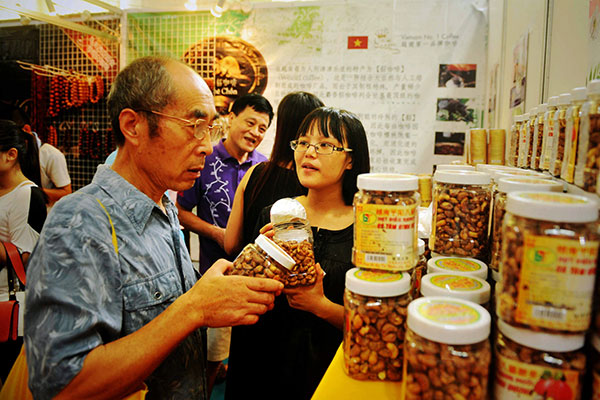Coffee trading center to give China global reach
By XU JUNQIAN (China Daily) Updated: 2015-07-07 08:57
|
 |
|
Coffee beans on display at an expo in Nanning, capital of Guangxi Zhuang autonomous region. Coffee consumption is increasing steadily with annual growth rates in excess of 15 percent in China. [Photo/China Daily] |
New facility in Shanghai Free Trade Zone may help promote domestic beverage consumption
The newly opened Coffee Exchange (Center) at the China (Shanghai) Pilot Free Trade Zone is expected to boost coffee consumption in the predominantly tea-drinking nation and give China a better say in the pricing of the world's second most commonly traded commodity, after crude oil.
The new center, which opened its doors on Monday, is expected to conduct transactions worth 84 billion yuan ($13.5 billion) by the end of 2017, and about 120 billion yuan in 2018.
If the goal is reached, the center will overtake Singapore as Asia's largest commodity exchange that trades coffee futures, and will be among the top-three coffee futures bourses in the world. The top two coffee trading bourses in the world are the Intercontinental Exchange in New York and the Euronext LIFFE in London.
"Shanghai's geographical location plus the preferential policies of the FTZ, in areas like finance, taxation and trading, are good indicators (of reaching the goal)," said Wang Zhendong, chief officer of the center.
The center has been set up by the Shanghai Coffee Association, of which Wang is the director, and approved by the FTZ and the Shanghai Municipal Commission of Commerce.
Wu Xingbao, vice-director of the commission, said: "Shanghai is in a perfect position to have its own coffee exchange as it is the largest coffee consuming city in China and the fount of all coffee industry developments in the country."
Although the first Starbucks outlet in the Chinese mainland was opened in Beijing in 1999, it is generally believed that coffee shops appeared and flourished in the 1930s in Shanghai, often called "oriental Paris", and were frequented by a large number of expatriates and local people.
Coffee consumption is increasing steadily with annual growth rates in excess of 15 percent in China, making it the world's fastest-growing and most potential market for the beverage, according to data provided by the Beijing-based China Coffee Association.
The center's e-commerce platform for trading of coffee futures is expected to be operational in a month's time, a period that Wang considers is enough for a coffee seed to sprout.
The business-to-business platform aside, the center will also have a retail platform for coffee connoisseurs to taste beans from countries as remote as Honduras, an international barista training center and a coffee-oriented service center bridging investors and young entrepreneurs who "may have any novel ideas about coffee", said Wang.
While the focus of the center will be to bring coffee beans from around the world to China, or later from China to neighboring countries like Japan and South Korea, it is also expected to promote use of coffee beans from Southwest China's Yunnan province.
- 2015 China International Fair for Investment and Trade kicks off in Xiamen
- China's commodity imports robust in Jan-Aug period
- China stocks rebound 2.92%
- 2015 China box office already past 2014 total
- China foreign trade decline widens in August
- Interview: JP Morgan's senior executive bullish on China
- Innovation, development the focus for NZ mayors
- Lives of freelancers

















